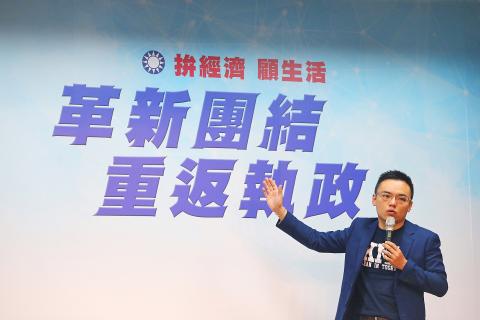The Chinese Nationalist Party (KMT) yesterday unveiled its schedule for a large-scale joint campaign event in Taichung tomorrow, bringing together the party’s mayoral and commissioner candidates for the six special municipalities and three central counties in a show of unity.
KMT Culture and Communications Committee deputy director-general Hung Meng-kai (洪孟楷) told a news conference in Taipei that the event is designed to demonstrate solidarity among its candidates within and across regions.
The event is to start at 7pm with a speech by KMT Legislator Wang Jin-pyng (王金平), the nation’s longest-serving legislative speaker, and former KMT legislator Yang Chiung-ying (楊瓊瓔) at the Taiping District Sports Ground on Zhongxing E Road.

Photo: CNA
The event would be divided into three parts, with the first featuring Changhua county commissioner candidate Wang Hui-mei (王惠美), Nantou County Commissioner Lin Ming-chen (林明溱), who is seeking re-election, and Yunlin county commissioner candidate Chang Li-shan (張麗善), Hung said.
In the second part, the party’s mayoral candidates for the six special municipalities — Ting Shou-chung (丁守中, Taipei), Hou You-yi (侯友宜, New Taipei City), Apollo Chen (陳學聖, Taoyuan), Lu Shiow-yen (盧秀燕, Taichung), Kao Su-po (高思博, Tainan) and Han Kuo-yu (韓國瑜, Kaohsiung) — would speak, Hung said.
Finally, KMT Chairman Wu Den-yih (吳敦義) and former president Ma Ying-jeou (馬英九) are to join the nine candidates on stage to show the party’s determination to stand united and conquer central Taiwan, Hung said.
Asked why the KMT chose Taichung for the event, Hung said that three of the four municipalities in central Taiwan are governed by the Democratic Progressive Party (DPP), but opinion polls showed that the KMT candidates would run neck-and-neck against their DPP opponents.
“If the KMT could win in Taichung, Changhua and Yunlin, that would be a victory for the party,” Hung said, adding that central Taiwan would be the party’s main focus in the Nov. 24 nine-in-one elections.

A strong continental cold air mass is to bring pollutants to Taiwan from tomorrow, the Ministry of Environment said today, as it issued an “orange” air quality alert for most of the country. All of Taiwan except for Hualien and Taitung counties is to be under an “orange” air quality alert tomorrow, indicating air quality that is unhealthy for sensitive groups. In China, areas from Shandong to Shanghai have been enveloped in haze since Saturday, the ministry said in a news release. Yesterday, hourly concentrations of PM2.5 in these areas ranged from 65 to 160 micrograms per cubic meter (mg/m³), and pollutants were

Taiwan’s armed forces have established response protocols for a wide range of sudden contingencies, including the “Wan Chun Plan” to protect the head of state, the Ministry of Defense (MND) said today. After US President Donald Trump on Saturday launched a series of airstrikes in Venezuela and kidnapped Venezuelan President Nicolas Maduro, concerns have been raised as to whether China would launch a similar “decapitation strike” on Taiwan. The armed forces regularly coordinate with relevant agencies and practice drills to ensure preparedness for a wide range of scenarios, Vice Minister of National Defense Hsu Szu-chien (徐斯儉) told reporters before a

EVA Airways on Saturday said that it had suspended a pilot and opened an investigation after he allegedly lost his temper and punched the first officer several times as their plane was taxiing before takeoff at Los Angeles International Airport. According to a report published on Thursday by The Reporter, the incident occurred after the flight’s Malaysian first officer tried to warn the Taiwanese pilot, surnamed Wen (文), that he was taxiing faster than the speed limit of 30 knots (55.6kph). After alerting the pilot several times without response, the first officer manually applied the brakes in accordance with standard operating

NOT AN OPENING: Trump’s violation of international law does not affect China’s consideration in attacking Taiwan; Beijing lacks capability, not precedent, an official said Taiwanese officials see the US’ capture of the president of Venezuela as a powerful deterrent to Beijing’s aggression and a timely reminder of the US’ ability to defeat militaries equipped with Chinese-made weapons. The strikes that toppled Venezuelan President Nicolas Maduro signaled to authoritarian leaders, including Chinese President Xi Jinping (習近平), US President Donald Trump’s willingness to use military might for international affairs core to US interests, one senior official in Taipei’s security circle said. That reassured Taiwan, the person said. Taipei has also dismissed the idea that Trump’s apparent violation of international law could embolden Beijing, said the official, who was not